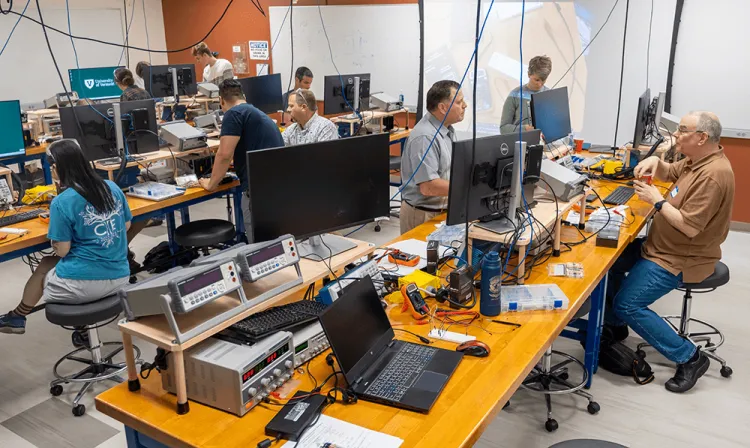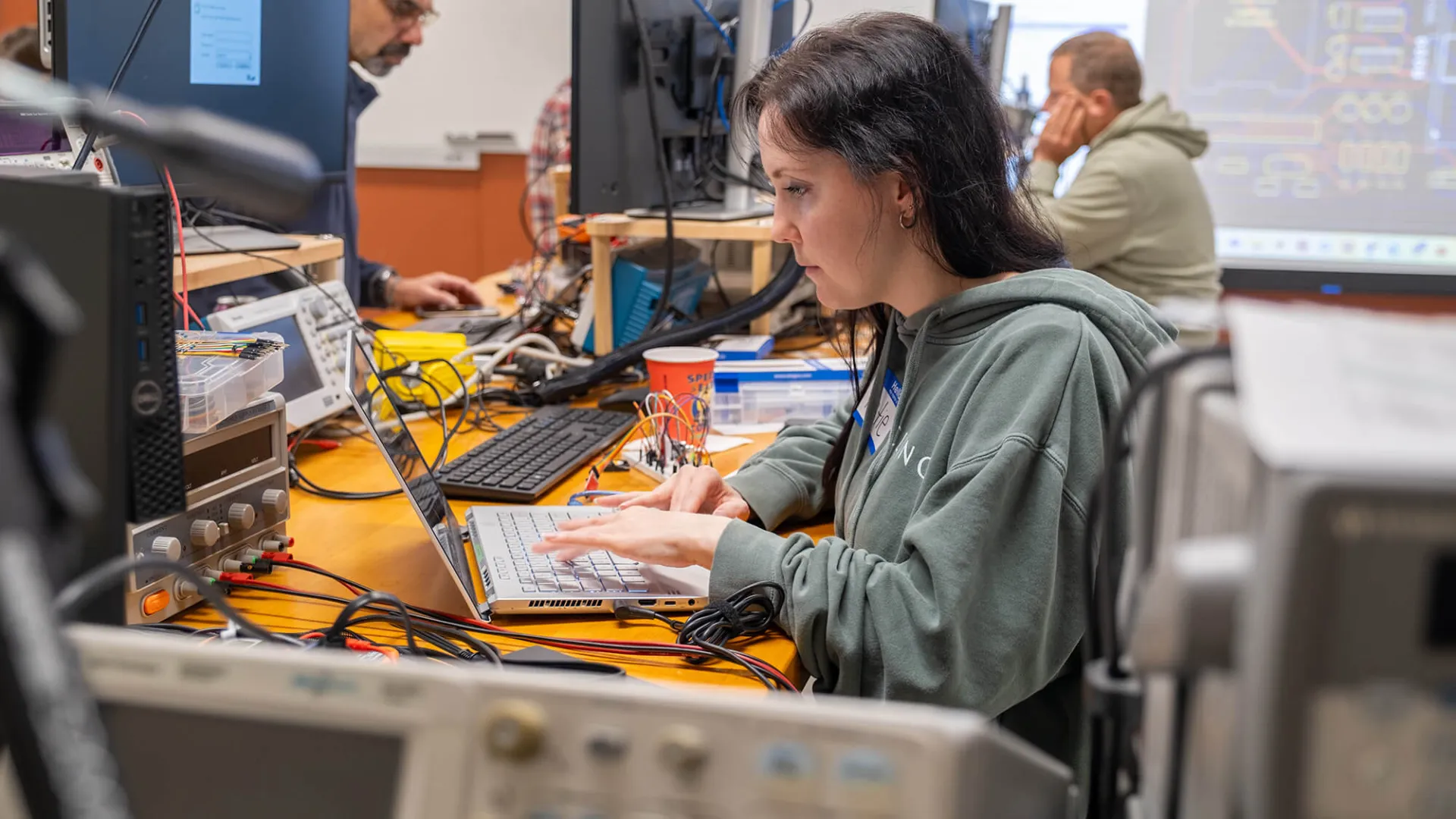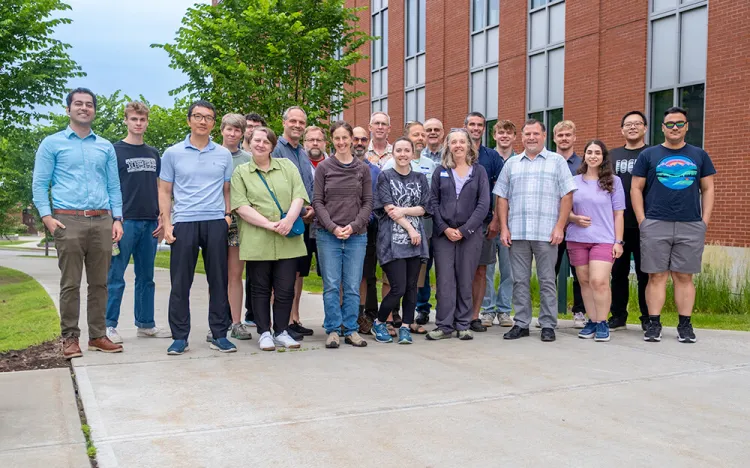
An enthusiastic group of K-12 educators from across the region joined CEMS faculty and graduate student instructors on campus this summer for a first-of-its-kind intensive weeklong learning retreat providing an in-depth introduction to the field of microelectronics through a sequenced series of lessons and hands-on workshops.
The SPARK (Summer Program Advancing Robotics and Knowledge in Microelectronics for K–12) learning retreat was devised and hosted by Professors Tian Xia (Electrical and Computer Engineering), Dryver Huston (Mechanical Engineering), and research assistant professor Jackson Anderson. Funded by a grant from the National Science Foundation with additional support from the Vermont Gallium Nitride (V-GaN) Tech Hub, the SPARK program aims to enhance the science curriculum in Vermont high schools by building stronger awareness of the field of microelectronics and the electrical and computer engineering disciplines that support their design and manufacture.
Microelectronics play a vital role in shaping the modern world, forming the backbone of virtually every digital device and system we rely on daily. From smartphones and medical equipment to aerospace technologies and advanced computing, microelectronics enables the miniaturization, speed, and efficiency that define today’s technological advancements. As the demand for faster, more powerful, and energy-efficient electronics continues to grow, research in microelectronics stands at the forefront of innovation, driving progress across industries.
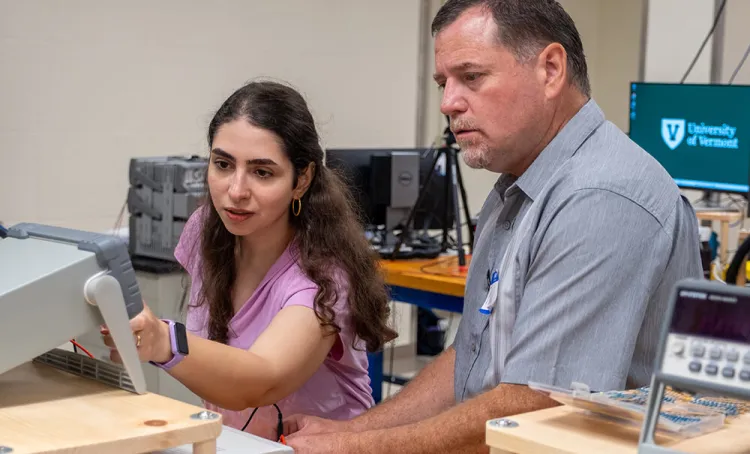
The need to fortify and expand the capabilities of domestic microelectronics industries is a key economic and security initiative for the nation. Unlike global trends, where student interest in electrical engineering is expanding rapidly, the domestic interest in undergraduate electrical engineering programs has slowed alarmingly.
According to the Information Technology and Innovation Foundation (ITIF), from 1997 to 2020, conferred degrees in electrical engineering rose just 37.5 percent, while degrees in all other fields rose 81 percent. Among U.S. citizens, the drop in interest has been even more precipitous with awarded bachelor’s and master’s EE degrees growing only 18.2 percent for U.S. citizens, while growing 110 percent for temporary residents during the same period.
The SPARK program aims to improve these statistics in Vermont and neighboring states by building partnerships with local science teachers in K-12 schools to bridge the current education gap in microelectronics. The UVM team structured each day of the week-long educational retreat with a mix of technical lectures and hands-on lab projects, not unlike the active curriculum CEMS students enjoy.
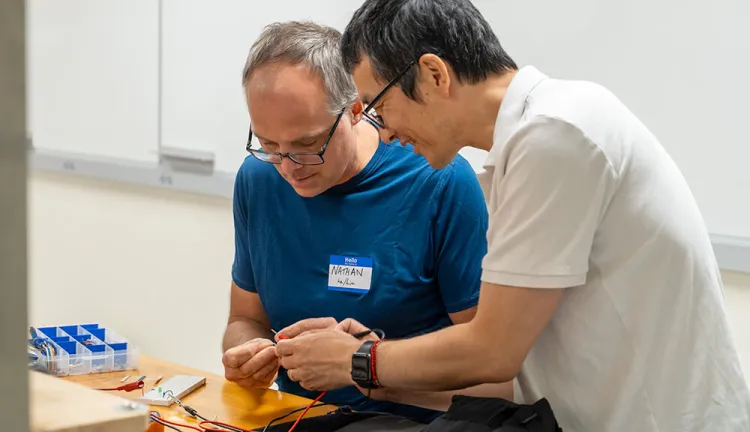
“We are excited to collaborate with Vermont K–12 science teachers to equip them with foundational knowledge and skills in electronics and robotics, helping them enrich their curriculum by integrating these elements," said Professor Xia. "By working closely with educators, our goal is to provide K–12 students across Vermont with hands-on exposure to electronics, making the subject more accessible and less intimidating. This experience may also inspire students to consider electronics as a potential field of study in college.”
On their first day, Professor Xia welcomed the educators and provided an introduction to the diverse and expanding field of electrical engineering, including current needs and future trends. Over the next five days, the educators would progress from lecture to lab, applying their new knowledge in hands-on projects that culminated with the creation of their own mobile robot.
In the first half of the week, electronic engineering graduate students Yi Liu, Soheyl Faghir Hagh, Parmida Amngostar, Swarup Chakraborty, and undergraduate research assistant Ian Cassidy guided the educators through designing, building, and programming increasingly more complex circuit boards and microcontrollers.
"This has been one of the absolute best weeks of professional development I've had in my 25 years of Science and Technology teaching. The skills we used—from Arduino coding to soldering to circuit design—all directly apply to my teaching context, and as a result of this workshop, the depth and breadth of my science and engineering instruction have dramatically increased.”
— Eli Rosenberg
Engineering & Design Instructor
Main Street Middle School
Electrical Engineering Research Assistant Professor Jackson Anderson led the second half of the week, where the participants learned more about essential microelectronic technologies like lithography, integrated circuits, and wireless communications. Assisted by Post Doctoral Associate Alireza Fath and undergraduate research assistants Ian Cassidy, Cooper Duggan, Alexander Hoefer, and Lanhjamin Tran, the educators designed and completed their final project, a wheeled robot with integrated wireless sensors.
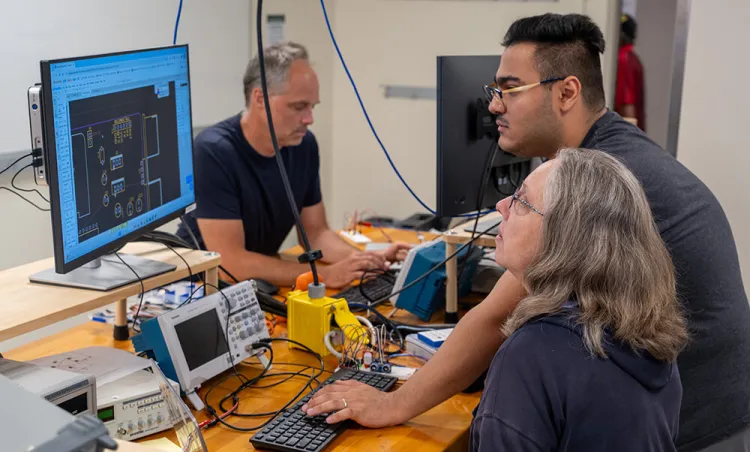
Each educator was provided a stipend to attend the program, which also included catered lunches and all the project materials. The retreat’s format, lesson content, and guided workshops proved popular among the educators, many of whom saw the opportunity as a uniquely effective first step for introducing students to both science and career opportunities awaiting explorers in microelectronics.
This opportunity was some of the most interesting, engaging, and valuable professional development I've done in my career as a teacher, said Anne Watson, a science and math teacher at Montpelier High School. “I would recommend it to any teacher looking to expand their understanding of how computers work and wants to engage their kids in hands-on activities.”
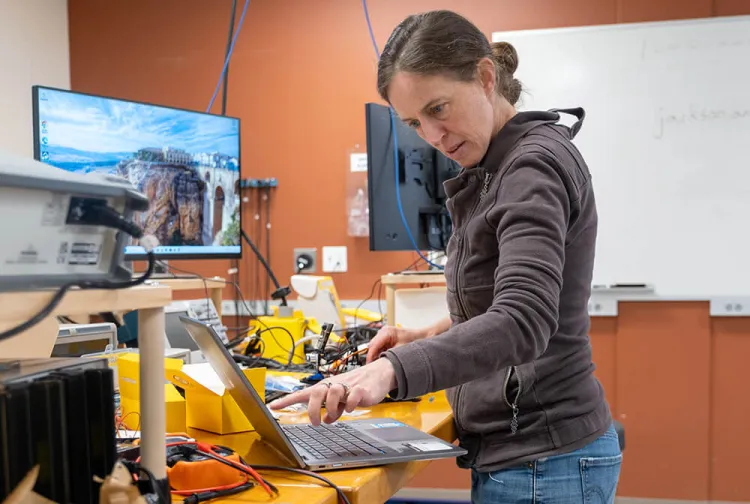
Conor O'Loughlin, a science teacher at Colchester High School, added, “Tian, his colleagues, and students were extremely well-prepared for this workshop. All of the activities were well thought-out and organized…The fact that we got to keep all the materials that we worked with will allow me to continue to figure things out and adapt the content for my students.”
“It is clear that an enormous amount of care and preparation went into this week and I am very grateful to have been a part of it, said Winooski School District work-based learning coordinator Jessica Handrick, “It reconnected me with what it is like to step out of my comfort zone as a student and I am leaving with truly applicable new skills, learning, and materials to impact our after school program, which is both a STEM Career Discovery Club and a Robotics Team.”
To complement the retreat, the UVM SPARK team launched an interactive support website, which includes microelectronics learning and development materials, including presentations and course materials. Future website expansion plans include an online forum for knowledge sharing and learning communities managed by college students majoring in microelectronics.
